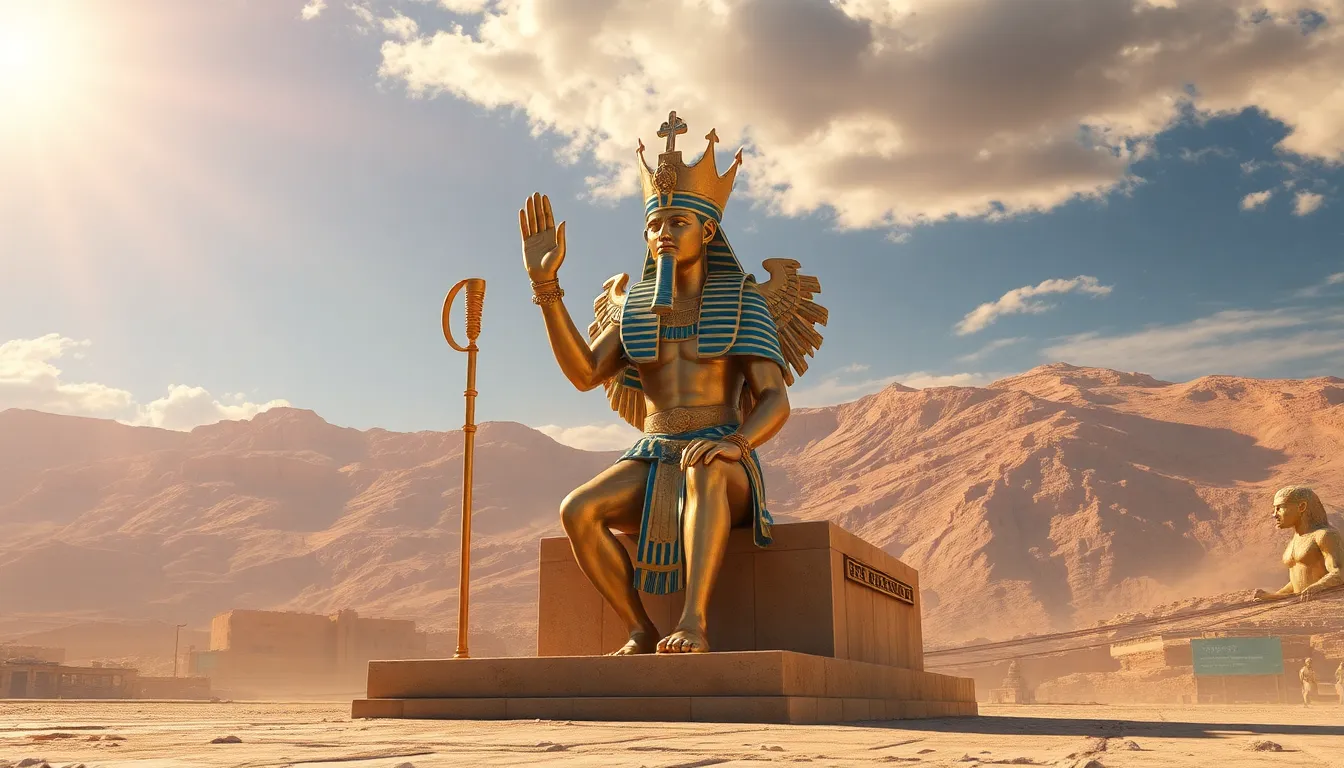The Importance of Divine Kingship in Egyptian Heritage
I. Introduction
Divine kingship refers to the concept in which the ruler of a kingdom is perceived not only as a political leader but also as a divine figure, often believed to be chosen or favored by the gods. In Ancient Egypt, this notion was central to the governance and cultural identity of the society. The Pharaohs, as divine kings, held immense power and influence, both in the spiritual and temporal realms. This article aims to explore the significance of divine kingship in ancient Egyptian society, its historical context, the role of Pharaohs, and its lasting impact on modern Egyptian identity.
II. Historical Context of Divine Kingship in Ancient Egypt
The concept of divine kingship emerged during the Early Dynastic Period (c. 3100-2686 BCE) of Ancient Egypt. This was a time when the unification of Upper and Lower Egypt set the stage for a centralized authority under the rule of a Pharaoh.
- Emergence of Divine Kingship: The unification of the two lands led to the establishment of the first dynasties, where rulers were venerated as living gods.
- Key Figures: Pharaohs such as Narmer (also known as Menes) and Djoser were pivotal in solidifying the notion of divine kingship.
- Evolution Over Time: Over the centuries, the concept evolved, influencing governance structures, royal decrees, and the society’s perception of authority.
III. The Role of Pharaohs as Divine Rulers
Pharaohs held a dual role as both political leaders and divine entities. This duality was central to their authority and governance.
- Political Leader: As the head of state, the Pharaoh was responsible for lawmaking, military decisions, and resource management.
- Divine Entity: Pharaohs were believed to be the earthly embodiment of gods, particularly Horus, and were expected to maintain Ma’at, the divine order.
Rituals and ceremonies played a significant role in reinforcing their divine status. Annual festivals, such as the Sed Festival, symbolized the Pharaoh’s renewal of power and connection to the gods. The relationship between the Pharaoh and the gods was crucial, as the Pharaoh acted as an intermediary, ensuring prosperity and favor from the divine realm.
IV. Symbolism and Iconography of Divine Kingship
Symbolism played a vital role in expressing the divine nature of kingship in Ancient Egypt. Various sacred symbols were associated with the Pharaoh, including:
- The Crook and Flail: Representing leadership and military power, these symbols were often depicted in royal iconography.
- The Ankh: Symbolizing life, it was frequently shown in the hands of Pharaohs, signifying their role in sustaining the people.
Artistic representations of Pharaohs in temples and tombs often depicted them in divine poses, demonstrating their exalted status. Notable structures like the Sphinx and the pyramids served to reinforce the notion of divine kingship, symbolizing the Pharaoh’s strength and connection to the afterlife.
V. Divine Kingship and Religion in Ancient Egypt
Divine kingship was deeply intertwined with religion in Ancient Egypt. The intersection of theology and politics established a framework where the Pharaoh’s authority was legitimized by divine will.
- Major Deities: Gods such as Horus, who represented kingship, and Osiris, who symbolized the afterlife, were central to the Pharaoh’s divine right to rule.
- Temples and Priesthood: Temples served as centers of worship and power, where priests performed rituals to maintain the Pharaoh’s divine authority and ensure the favor of the gods.
VI. Impact of Divine Kingship on Society and Culture
The concept of divine kingship significantly influenced social hierarchy and cultural expressions in Ancient Egypt.
- Social Hierarchy: The Pharaoh sat at the top of the social pyramid, with nobility, priests, and commoners beneath. This hierarchy was justified by the divine nature of kingship.
- Law and Order: The Pharaoh was seen as the source of law, with decrees viewed as divinely sanctioned, which contributed to stability and order in society.
- Cultural Expressions: Divine kingship inspired vast cultural expressions, from monumental architecture to literature and art that celebrated the Pharaoh’s divine role.
VII. Legacy of Divine Kingship in Modern Egyptian Identity
The legacy of divine kingship continues to resonate in modern Egyptian identity. Themes of divine leadership and reverence for the past are evident in contemporary culture.
- Continuation of Themes: Modern Egypt often reflects on its Pharaonic heritage, celebrating its ancient roots through festivals and cultural events.
- Influence on Political Structures: Some aspects of political ideology in Egypt can be traced back to the divine kingship model, promoting a sense of national pride and unity.
- Tourism and Heritage Preservation: The legacy of the Pharaohs attracts millions of tourists annually, emphasizing the importance of preserving Egypt’s ancient heritage.
VIII. Conclusion
In conclusion, the importance of divine kingship in Egyptian heritage is profound and multifaceted. This concept shaped the political, social, and cultural landscape of Ancient Egypt and continues to influence modern perceptions of identity and governance. The enduring legacy of ancient beliefs reminds us of the significance of understanding and appreciating the rich history that has shaped contemporary Egypt. As we delve into the past, we are called to recognize and honor the contributions of ancient Egyptian heritage in our modern world.




